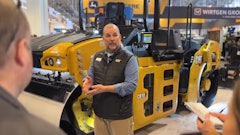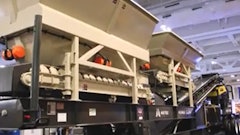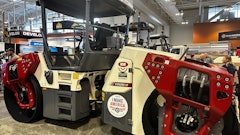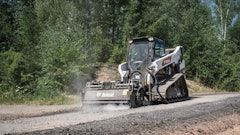
When Brooks Construction celebrated the grand opening of its new Fort Wayne, Ind., plant, it also introduced HyRAP, the industry's first 100% recycled asphalt paving material.
A family-owned and -operated business, Brooks Construction has a history of pursing innovation. It was founded over 100 years ago by John Foster Brooks and Lester Edward Ginn. In addition to several asphalt production facilities in the Fort Wayne area, it also offers infrastructure construction services to private, commercial and governmental customers. Over the last 20 years, Brooks Construction has won numerous awards on the state and national levels for quality highway construction and specialized commercial work.
With its strong emphasis on quality, Brooks Construction was actively involved with the testing and construction of one of the first SUPERPAVE highways in Indiana. Additionally, it created the first private AASHTO Accredited Laboratory in Indiana in order to ensure the highest quality pavement for its customers.
Big leap forward
With its history of wanting to lead the pack, it's no surprise Brooks Construction unveiled HyRAP. "We didn't want to take a small step," says co-owner John Brooks. "We wanted to take a big leap forward."
During HyRAP production, a rejuvenating agent restores resident asphalt bitumen to performance grade material, often exceeding the original value and specifications. "Advanced quality control and new technological applications allow HyRAP to meet or exceed current hot mix asphalt performance standards," says John Barry with Crowley Chemical Co., a supplier that worked with Brooks in developing HyRAP.
According to both Brooks and Barry, there are several benefits to the 100% recycled asphalt material. First, environmentally, the product makes sense as a sustainable pavement. Second, customers and taxpayers achieve a cost savings. “There is no need for taxpayers to bear the continually rising cost of road construction when these assets are in place to recycle and reuse and have already been paid for once," Brooks explains. "We can begin mining our own roads."
Additional benefits include:
- HyRAP can be produced without any additional mining of aggregates and without need for virgin bitumen. Both petroleum consumption and reliance on foreign oil are reduced. "We're taking an investment already made and making it new again," says Brooks.
- Future HyRAP facilities can be located close to jobsites because there is no need to be near virgin aggregate sources or quarries. This significantly reduces the costs and diesel emissions associated with trucking.
- Reclaimed asphalt pavement (RAP) is not affected by time and reuse. The properties of original virgin materials can be restored completely and reused indefinitely. As the costs of virgin materials rise, there is additional motivation to fully recycle existing materials.
For now, HyRAP can be used on parking lot and street projects. Brooks says more performance data will be needed before the product can be used on highways. (See box, "HyRAP Projects.")
"There's a tremendous interest in HyRAP," says Brooks. "One of the hurdles we have with using the product on highways is getting the performance data and getting people to believe that data."
RAP management is the greatest challenge with this product, says Brooks. "We're making a recipe within exacting tolerances," he explains. "To do this precisely, we have to control the fractionation of the stone. We'll bring millings in and screen on-site to control this."
Brooks says a product like HyRAP will never replace all the mix designs out there, but it is an alternative. "People like to have alternatives," he says.
First plant of its kind
Brooks stresses the uniqueness of the new Brooks Construction facility and that the new venture was funded entirely by private dollars, without grants or government funding. “This plant is the first of its kind in the United States, and the only one with proven capabilities to produce consistent quality at high rates of recycle usage, using up to and including 99+% recycled materials,” he said.
Many of the components at the Fort Wayne facility are proprietary – constructed via local manufacturers in the Fort Wayne area. "We have some components, like Gencor silos, Kolberg conveyors and ALmix baghouses, that come from our usual suppliers," says Brooks. "But we farmed out many of the components as a cost savings and the ability to easily change designs as necessary.
"There are a few additional cold feed bins for RAP, but otherwise it looks like any other," Brooks says. "We really wanted our design to be flexible so we could include other products in the future."
The facility does incorporate a thermal oxidizer on its incinerator to eliminate any blue smoke during the drying/heating process. Preliminary tests show that emissions of this facility are at or below current plant standards in Indiana and are far below the plant that it replaced. Projected plant energy consumption is either neutral or negative when taking into account the energy consumed from the quarry to the paver using more traditional hot mix methodologies.
The new plant is expected to produce asphalt at the same rates as traditional facilities.
Eye on new technology
Recycling isn't new to Brooks Construction.
“We were the first and only local company to take advantage of landfill waste gases to help drive our Fort Wayne asphalt plant," Brooks says.
Brooks Construction endeavors to use as much recycled concrete as possible for aggregate base on paving projects, allowing the company to pass cost savings to customers and reduce landfill usage. The company has integrated steel slag into asphalt. The steel-mill by-product, combined with traditional RAP and a bit of virgin binder, produces a very high quality and great looking surface.
Processed shingles, rubber and glass have reduced consumption of virgin natural resources. Warm and cold asphalt mixes are also used, significantly reducing energy consumption and plant emissions.
"There's always a demand for pavement," says Brooks. "Mother Nature makes it necessary to maintain our roads, and when the funding levels aren't there, like the situation we have today, then you have to develop new technologies to get there.
"It's tougher to develop new technologies and overcome these challenges in down times, but it's the new technologies that will help you grow and thrive," he continues. "You can't just close your eyes to the advantages of new technologies."
Brooks says they think HyRAP can be produced with warm mix processes, but the company is not yet ready to try the combination.
"We're going to continue investigating every niche and not stay complacent," he says. "We're going to keep doing what we've always done, which means as we see things to improve our business and customer relations, we'll do it."
HyRAP Projects
While HyRAP may not be highway-ready, it has been used on several projects. Here are two examples:
- Bishop Dwenger Catholic High School parking lot. This school needed a new parking lot, so Brooks Construction offered the new HyRAP product. The project used about 800 tons of the product with no particular challenges, says John Brooks. The mix laid well, and there was a combination of hand work and machine work to finish. "There was a learning curve with the crew as far as when to roll," he says. "With this product you can roll faster than traditional mixes."
- Street project in Fort Wayne. This industrial street had a lot of semi-truck traffic and needed a durable mix. "The rejuvenator and RAP in the HyRAP product acts like a modified asphalt and not a standard mix," says John Brooks. "The mix is very stable and offers very little movement. It also allows you to get traffic on the pavement faster, which was necessary with this project."


























